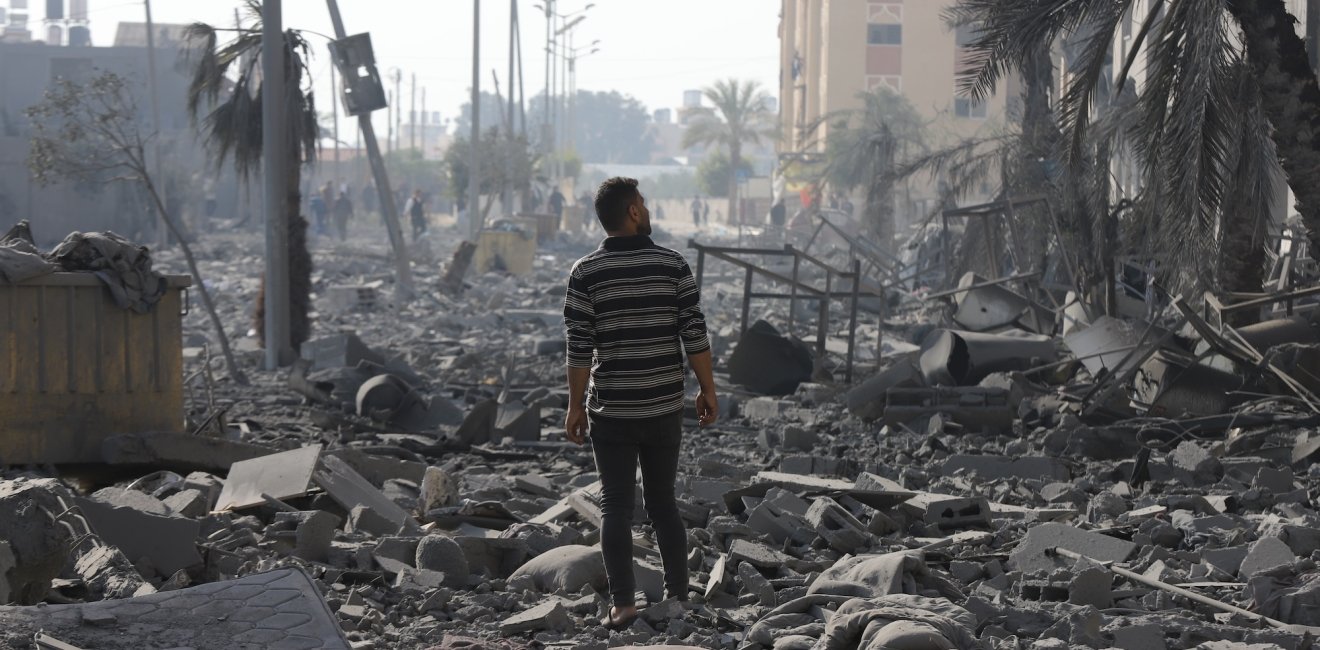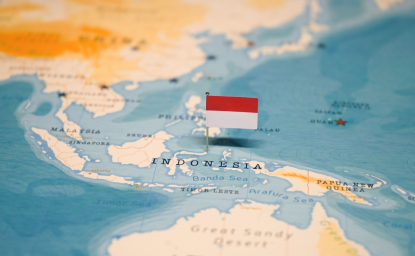US policy in the Middle East is defeating its own stated goals. Ceasefire proposals that focus only on Gaza, including the proposal presented by US President Joe Biden and endorsed by the United Nations Security Council, will further empower Hamas and prolong and expand the conflict throughout the region.
To protect its influence and interests, the United States needs to quickly and fundamentally recalibrate its policy, or else risk a situation that can no longer be salvaged. Specifically, a successful policy must have bolder aims than a ceasefire—or even peace—so that all Palestinians and all Israelis can live in safety, freedom, and dignity. Simply put, a ceasefire in Gaza without an end to the occupation will only perpetuate the conflict. The US must leverage what remains of its influence to achieve this goal, before it is too late.
Devastation and occupation
On October 7, 2023, Hamas and allied extremists launched a surprise attack on southern Israel from the Gaza Strip, killing 1,200 Israeli civilians and soldiers. Since then, 37,400 Palestinians have been killed in Gaza, according to the United Nations, with scores of thousands more maimed—not including Israeli combat casualties. Over 60 percent of all buildings (homes, schools, mosques, churches, etc.) have been damaged or destroyed; farmland is laid to waste; and 2.2 million are being starved while living in constant terror in makeshift camps where they are frequently bombed, shot, or burned alive.
A program for the reconstruction of buildings will not heal the trauma nor provide the basic rights and privileges to which all humans are entitled, including Palestinians in the Occupied Territories and refugee camps around the world.
All normal life has stopped completely—there are no schools, universities, workplaces, and nowhere to go at all. The US-proposed ceasefire plans cannot fix this, nor does it address the violence in the West Bank (including East Jerusalem). A program for the reconstruction of buildings will not heal the trauma nor provide the basic rights and privileges to which all humans are entitled, including Palestinians in the Occupied Territories and refugee camps around the world.
Meanwhile, Israel’s war in Gaza and continuing oppression in the West Bank, enabled by US money, weapons, and political support, both empower resistance and bestow upon Hamas the mantle of leading it. Among Palestinians, there is much disagreement with the religious extremist ideology of Hamas—even in Gaza, its support hovered no higher than 30 percent on the eve of the attacks—but there is far less disagreement about the right to resist occupation and the invading Israeli army.
The right to resist
Resisting a violent foreign occupation is considered to be legitimate, and, though the Hamas attack on October 7 was a sudden shock, the current war in Gaza is seen by Palestinians as a continuation of a decades-long war and occupation. As long as there are Israeli forces occupying any part of the Palestinian Territories, there will be Palestinians who feel duty- or revenge- bound to resist them.
This is even more likely given the weakness and corruption of the alternative, the Ramallah-based Palestinian Authority—long seen by Palestinians as both collaborating with and enabling the Israeli occupation—and the absence of hope in a political solution to the conflict.
Thus, prolonging the Israeli occupation of the territories will ensure that Hamas becomes the de facto leadership of the Palestinians, just as it takes on a de jure role through the proposed ceasefire agreement. This is even more likely given the weakness and corruption of the alternative, the Ramallah-based Palestinian Authority—long seen by Palestinians as both collaborating with and enabling the Israeli occupation—and the absence of hope in a political solution to the conflict.
This is an essential point: the Azov brigade in Ukraine was a fringe extremist group, but became a national symbol of the resistance when Russia invaded (and is now receiving arms from the United States). Similarly, the communist party in France grew its power and relevance by playing a leading role in resisting the Nazi occupation of France during WWII.
Equally, unconditional US support to Israel over the years has prolonged and exacerbated the conflict. It has enabled the rise to power of Israeli extremists, such as Israeli Minister of Finance Bezalel Smotrich, who has openly called for ethnic cleansing. This fans the flames of the conflict in real terms, as violent settlers in the West Bank are increasingly supported by a flawed political and judicial system. It also creates a reaction among Palestinians, who do not see a partner for peace on the Israeli side, further growing the void that Hamas has been able to fill. This must be factored into any US policy going forward.
And yet, where boldness and fresh thinking are direly needed, the Biden administration’s reticence toward altering its long-held Israel policy is remarkable. Israel blatantly disregarded the US “red line” in attacking Rafah, which was the subject of an International Court of Justice order and was an Israel-designated safe zone for over a million refugees. Yet, the United States has done nothing as Israel has advanced its offensive, adding another nail in the coffin of US credibility and influence.
But the United States not only appears powerless before its allies and enemies, it also cheapens itself by engaging in details and involvement that should be far beneath it—nitpicking over trucks and gates and pounds of grain. The $320 million spent on a “humanitarian aid” pier (already damaged once, and reportedly unlikely to last much longer), is having minimal impact and was only needed because Israel was not allowing a sufficient number of trucks through its checkpoints in the first place.
As a long-term strategic supporter of Israel, the principal source of Israeli aid and arms, and the main power broker in the region if not in the world, the United States should be able to use its power and leverage to achieve better and bigger outcomes for the region, rather than haggling over the number of trucks coming through a specific checkpoint on a given day.
The ceasefire
In this context, Biden’s ceasefire proposal of May 31—a temporary six-week ceasefire in Gaza leading to a more permanent one (without reference to the rest of the Occupied Territories) and the release of hostages and prisoners followed by a reconstruction program—even if successful, would be no more than a makeshift patch that ensures continuing conflict.
Yes, a ceasefire would achieve the long-awaited release of those held in captivity, give a respite to the millions in Gaza from the daily bombings and killing, and pause their enforced starvation. But without a political process that ensures the end of the occupation, starting with the withdrawal of Israeli troops from Gaza, it is bound to lead to renewed fighting, which will spread across Israel and the occupied territories, and regionally into Lebanon and beyond.
One of the lessons of the United States’ decades-long War on Terror was that an extremist ideology cannot be defeated militarily; even the commander of the Israeli army recently stated that Hamas cannot be defeated thus. It must be defeated politically, requiring a context where alternative liberal and secular political viewpoints can flourish.
As the United States continues to concede to Israel’s worst instincts, it risks losing its remaining political and moral leverage, with devastating consequences for itself and the international order.
In that way, the US proposal is neither “big-picture” enough in its outcomes, nor bold enough in its methods. Worse, as the conflict wears on, the United States’ ability to play a positive role in the region and foster a long-term peaceful outcome is evaporating—along with its prestige. Only by adhering to both international and domestic law (such as the Leahy Law) can the United States best help Israelis, Palestinians, regional allies, and protect its essential interests. Time is of the essence—the region is at a boiling point. As the United States continues to concede to Israel’s worst instincts, it risks losing its remaining political and moral leverage, with devastating consequences for itself and the international order.
There is no need for a ceasefire agreement to stop the killing in Gaza—on the contrary, ceasefire negotiations only empower and legitimize Hamas. Also, focusing on the terms of a ceasefire enables the parties, whether Hamas or Israel, to prolong the negotiations indefinitely, at massive humanitarian cost. As the invading party, Israel can and should end hostilities unilaterally and withdraw, thereby ending the current violence, which even some in the Israeli army have admitted will neither destroy Hamas nor free the hostages—who can and should be released in a separate exchange.
Unlike the previous Israeli withdrawal from Gaza in 2005, this should be conceived as part of a holistic political resolution to the Palestinian-Israeli conflict, which would achieve real long-term peace and security, and must be supported by an international peacekeeping force empowered under international law. By removing the underlying cause for the violence, as occurred in Northern Ireland, the violence will cease.
The United States should lead this temporary force to provide security for Israelis and Palestinians in Gaza and throughout the Occupied Palestinian Territories. Such a force would oversee aid and reconstruction, and ensure the stability required to democratically renew leadership on both sides within this concrete vision of long-term peace. Finally: if this peace is to be a two-state solution, then that should be the clear legal basis for the intervention, and not its potential outcome. This is also highly likely to be its last chance.
The views expressed in this piece are those of the author and do not express the official position of the Wilson Center.






